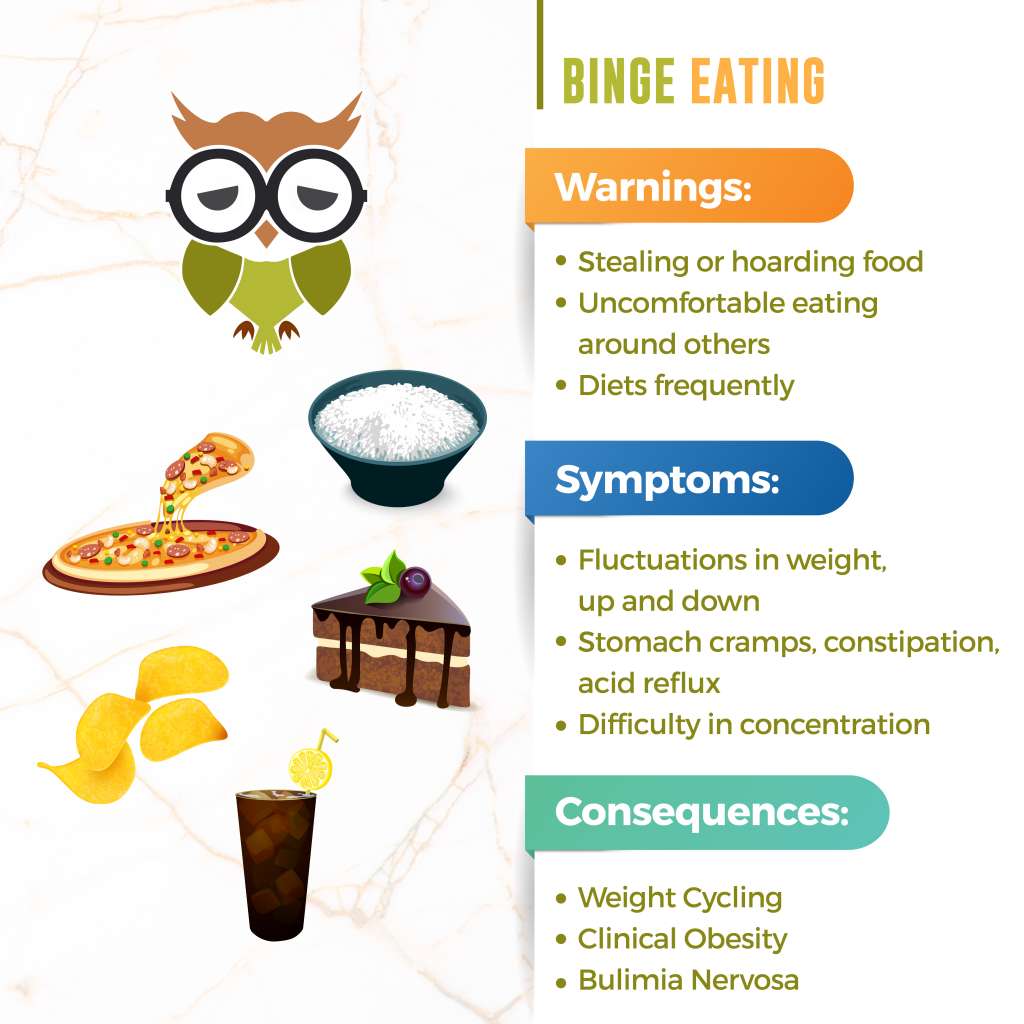Binge Eating
The following information may be triggering to those with eating disorders. Please be mindful should you continue reading.
A severe and life-threatening disorder, Binge Eating Disorder is characterized by recurring episodes of excessive food consumption. A recent but important addition to the officially recognised list of disorders, binge eating is capable of immense harm to the body and mind. Let’s understand what exactly this disorder entails.

Basics of Binge Eating:
People who binge eat are not just driven by hunger or due to a metabolic need. For some it’s the hedonistic value, for others compulsion to eat and yet others for the stress relief. Binge eating is a behaviour which develops into Binge Eating Disorder.
Diagnosis:
A binge eating episode is characterized by the following:
- Eating a significantly large quantity of food than most people would eat in the same period of time, in similar circumstances
- Experiencing a lack of control with eating during this episode
Binge eating episodes are also accompanied with at least three of the following:
- Eating faster than normal
- Eating until feeling uncomfortably full
- Eating large quantities of food despite not being physically hungry
- Eating alone out of embarrassment for food quantity
- Feelings of self-disgustion, depression and guilt from overeating
| Mukbang: A growing trend this past year among Youtube vloggers are ‘Mukbangs’, where people eat ridiculous amounts of food on camera. These videos have both a positive and negative impact, where some feel that mukbangs encourage healthy appetites and others find it normalizes eating disorders. |
Warning Signs:
Binge eating is an insidious disorder, it gradually develops over a period of time. Be wary of these warning signs:
- Stealing or hoarding of food in strange places
- Withdrawing from friends and usual activities
- Going on-and-off on diets
- Uncomfortable while eating around others
Symptoms:
Binge eating directly impacts your physiology and psychology, it comes with a plethora of symptoms. They include
- Fluctuations of weight, both increase and decrease.
- Stomach cramps
- Constipation
- Acid Reflux
- Difficulty in concentration
| Neurobiology of Binge Eating: Binge eating has been classified as a disorder but the neurobiology mirrors the same traits of substance abuse behaviour. Delicious foods and fluids provide the same reinforcement effects to the natural reward pathways in your brain as addictive substances like drugs. |
Consequences:
The prominent health risks associated with Binge Eating Disorder are clinical obesity, weight stigma and weight cycling. Yo-yo dieting is common among those with BED. Not all people who are clinically obese have BED, but two-thirds of people with BED are clinically obese. Similarly, while most people with BED have higher-than-average weight, it can be diagnosed at any weight.
More severe cases of BED lead to Bulimia Nervosa: a life-threatening eating disorder involving cycles of binge eating and behaviours like self-induced vomiting.
Treatment:
Studies show that psychological interventions like Cognitive Behavioural Therapy (CBT) and Behavioural Weight Loss Therapy (BWLT) do seem effective for binge eating disorders.
CBT directly targets the core of binge eating since both the psychopathology of eating disorders and over-evaluation of shape and weight are cognitive in nature. A study suggests that people start with extreme and highly specific dietary rules when trying to reverse BED. However, this tends to fail and patients are further negatively affected. CBT helps in this regard.
Cheers and see you soon,
![]()
References
- Binge eating disorder treatment: a systematic review of randomized controlled trials. Brownley KA, Berkman ND, Sedway JA, Lohr KN, Bulik CM
- Personality and eating behaviors: a case-control study of binge eating disorder. Davis C, Levitan RD, Carter J, Kaplan AS, Reid C, Curtis C, Patte K, Kennedy JL
- Brownley, Kimberly A., et al. “Binge-Eating Disorder in Adults.” Annals of Internal Medicine, vol. 165, no. 6, 2016, p. 409., doi:10.7326/m15-2455.
- Mathes, Wendy Foulds, et al. “The Biology of Binge Eating.” Appetite, vol. 52, no. 3, 2009, pp. 545–553., doi:10.1016/j.appet.2009.03.005.
- National Eating Disorders



